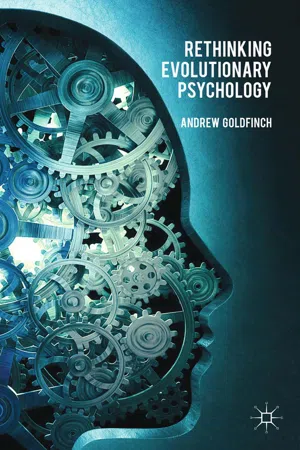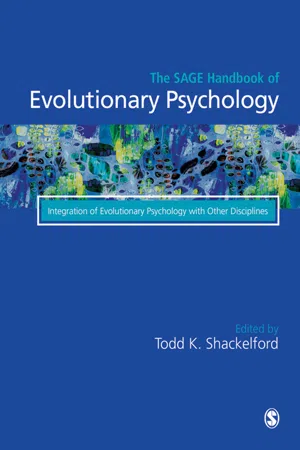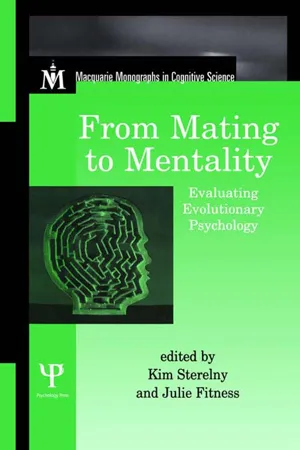Evolutionary Perspective in Psychology
The evolutionary perspective in psychology focuses on how human behavior and mental processes have evolved over time to enhance survival and reproduction. It emphasizes the role of natural selection in shaping psychological mechanisms and traits. This perspective seeks to understand human behavior by examining how it may have been adaptive in the context of our ancestors' environments.
8 Key excerpts on "Evolutionary Perspective in Psychology"
- eBook - ePub
- A. Goldfinch(Author)
- 2015(Publication Date)
- Palgrave Macmillan(Publisher)
...1 Evolutionary Psychology as a Paradigm 1.0 Introduction We have evolved by natural selection. Even if not everything about an organism is an adaptation for survival and reproduction, it seems inescapable that organisms are well adapted, at least to the environment in which they evolved. Most consent to that proposition. But there is disagreement, often quite animated disagreement, as to what implications this has for psychology. Our ancestors faced a multitude of recurrent survival and reproduction problems. In order to survive and reproduce, one must locate and secure resources; avoid pathogens; avoid predators; find a mate; counter threats from mate poachers; form and maintain coalitions and relationships; establish and protect one’s status in a societal hierarchy; and so on. These problems are known as ‘adaptive problems’ and solutions to these problems promote reproductive success. One proposal, perhaps the dominant view, is that selection favoured one or a few general-purpose psychological mechanisms, general learning and decision-making mechanisms sufficient to generate multiple behavioural solutions to multiple adaptive problems. If this is the case, applying evolutionary perspectives to psychology might have limited mileage. An alternative proposal is that some or many of the problems were solved by dedicated psychological adaptations. Just as we inherit physiological specialisations, so too we might inherit psychological specialisations. If this is the case, this opens up the possibility that evolutionary theory can open up new lines of research in psychology. This is the possibility evolutionary psychologists pursue. Quite reasonable, isn’t it? If selection pressures have favoured physiological adaptations, then they might also favour psychological adaptations, and that this perspective might be useful in understanding psychology in some way. In a way, pursuit of this line of thought is ‘inevitable’ (de Waal, 2001)...
- eBook - ePub
Theory in Social and Cultural Anthropology
An Encyclopedia
- R. Jon McGee, Richard L. Warms(Authors)
- 2013(Publication Date)
- SAGE Publications, Inc(Publisher)
...Eric J. Pedersen Eric J. Pedersen Adam Smith Adam Smith Debra Lieberman Debra Lieberman Evolutionary Psychology Evolutionary Psychology 246 250 Evolutionary Psychology Evolutionary psychology integrates principles from a wide range of fields to study the evolved psychological architecture of the human mind. Rather than functioning as a subfield within psychology, evolutionary psychology is an approach that can be applied to any area of psychology: developmental, cognitive, social, clinical, and so on. At its core, evolutionary psychology is based on a simple principle: The human brain, like every other organ in the body, evolved over millions of years of natural selection; to understand the functional design of the mind/brain, as with other organs, one must consider the recurring sets of selection pressures that existed over the course of human evolution. Each recurring selection pressure, that is, each feature of the world that influenced survival and reproduction (e.g., disease-causing organisms and predators), created an adaptive problem (e.g., avoiding contact with contaminated substances and avoiding predators, respectively). Evolutionary psychology considers the adaptive problems humans likely faced and generates models of the possible mechanisms that evolved to solve them. So, for instance, research and theorizing on disgust suggest that this emotion is a panhuman system that evolved in response to the selection pressures posed by disease-causing organisms and motivates the withdrawal from substances possessing cues to contamination. Importantly, evolutionary psychology entails descriptions at multiple levels of analysis, most notably, ultimate and proximate levels of analysis. An ultimate level of analysis explains why a particular system exists—that is, how it would have promoted survival and/or reproduction in ancestral environments...
- eBook - ePub
- M. Brent Donnellan, Richard E. Lucas(Authors)
- 2020(Publication Date)
- Wiley-Blackwell(Publisher)
...These components of human nature have been shaped by natural selection in ways that create species‐typical characteristics. According to this idea, some patterns of thoughts, feelings, and behaviors exist because they helped our ancestors survive and reproduce. Psychologists who consider these issues are called evolutionary psychologists. Traditionally, evolutionary psychology has not been much concerned with individual differences; but that is beginning to change. The broad goal of evolutionary psychology is to explain the ways that human thinking, feeling, and behaving have been shaped by the processes of natural selection (e.g., Buss, 1991). Taking an evolutionary approach to personality means trying to explain how personality differences could be understood using the logic of natural selection. Historically (or at least as far back as the early 1990s), some evolutionary psychologists expressed skepticism about using natural selection to understand differences in personality attributes like the Big Five trait domains. Although it seems fairly innocuous, calling something “noise” in academic circles (as indicated by the last quotation in the opening) is generally seen as dismissive—it is often a roundabout way of saying that something is unimportant. After all, most people care about signal (the important stuff) rather than noise (the static that masks the signal). More recent work, however, has used principles from evolutionary psychology to better understand variation in personality. The objective of this chapter is to illustrate how such advances are changing how personality attributes are understood from evolutionary perspectives (e.g., Buss & Hawley, 2011 ; Nettle, 2006). Accordingly, the goal of this chapter is to illustrate why it is a myth to assume that evolutionary psychology is not relevant to personality psychology...
- eBook - ePub
The SAGE Handbook of Evolutionary Psychology
Integration of Evolutionary Psychology with Other Disciplines
- Todd K. Shackelford(Author)
- 2020(Publication Date)
- SAGE Publications Ltd(Publisher)
...12 Evolutionary Psychology and Anthropology Elizabeth Cashdan, Joan B. Silk, and Aiyana K. Willard Introduction An interest in human evolution has a long history in anthropology, but it was not until the 1970s that an explicitly Darwinian view of human behavior galvanized scholars simultaneously in anthropology, biology, and psychology. The fields of evolutionary psychology and evolutionary anthropology share a theoretical foundation in natural and sexual selection, and both reject what Tooby and Cosmides (1992) have called the ‘standard social science model’ of human nature as a blank slate unconstrained by biology. Yet the early years were also fractured by disputes between the fields. Evolutionary psychologists faulted evolutionary anthropologists (especially human behavioral ecologists) for their assumption that behavior will be fitness-enhancing, arguing that adaptations to the ‘environment of evolutionary adaptedness’ (EEA) could be best understood by focusing on the evolved mental modules themselves (Symons, 1992). Evolutionary anthropologists, in turn, faulted evolutionary psychologists for giving insufficient attention to the trade-offs between different goals required to respond adaptively in different environments (Smith et al., 2001). These differences are waning as evolutionary psychologists expand their attention to environmental sources of variation and as evolutionary anthropologists consider the psychological mechanisms that mediate environmental influences on behavior. Anthropology is defined by its temporal and cross-cultural breadth, both of which shed light on the contexts in which our psychological adaptations evolved. We begin by considering humans in a phylogenetic context, in order to understand the evolutionary antecedents of our cognitive abilities, prosociality, and psychological adaptations for social learning...
- eBook - ePub
From Mating to Mentality
Evaluating Evolutionary Psychology
- Kim Sterelny, Julie Fitness, Kim Sterelny, Julie Fitness(Authors)
- 2004(Publication Date)
- Psychology Press(Publisher)
...However, another possibility exists. The view we defend in this chapter is that there is nothing wrong in principle with taking an evolutionary approach to human behavior or cognition. In practice, however, the impoverished view of evolution and psychology adopted by many evolutionary psychologists, and the weakness of their empirical science, is frankly rather embarrassing (see Lloyd, 1999; Lloyd & Feldman, 2002 for a similar perspective on evolutionary psychology). Before proceeding any further we should emphasize that the target of our critique here is not a broad, comparative evolutionary approach to psychology (evolutionary psychology or “evolutionary psychology in the round”). Instead, our attack is confined to the specific program of Evolutionary Psychology associated with the “Santa Barbara church of psychology” (Laland & Brown, 2002). Evolutionary Psychology (EP) is a nativist approach to cognition that views the human mind as a collection of modules design by natural selection to solve the problems faced by our Pleistocene ancestors. This program was christened in the Adapted Mind book (Barkow, Cosmides, & Tooby, 1992), and proselytized to the lay public in Steven Pinker s (1997) modestly titled book, How the Mind Works. Its followers have applied EP doctrines to everything from social reasoning to preferences for green lawns and certain genres of erotic fiction (“slash” novels—see Symonds & Salmon, 2001). EPs narrow focus on unique human adaptations, a monomorphic view of the mind, massive modularity, and a cartoon view of the Pleistocene environment have all been the subject of considerable critique (Fodor, 2000; Griffiths, 2001; Hull, 2002; Irons, 1998; Karmiloff-Smith, 2000; Samuels, 1998; Stolz & Griffiths, in press). Here we assess how successful EP has been in meeting the challenge of that most quintessentially Darwinian task—adaptive explanation. THE CHALLENGE OF ADAPTIVE EXPLANATION EP is adaptationist and proud of it...
- eBook - ePub
The Cognitive Sciences
An Interdisciplinary Approach
- Carolyn P. Sobel, Paul Li(Authors)
- 2013(Publication Date)
- SAGE Publications, Inc(Publisher)
...The question is not “What are we and how do we work?” but rather “How did we become as we are?” The name that has been given to this project is evolutionary psychology—but be aware from the start that the name does not imply simply a subset of the field of psychology. The research conducted within it is concerned with the evolutionary approach to understanding human behavior and the human mind. Before proceeding with a brief necessary background discussion of the theory of evolution, let us take note of the guiding principles of evolutionary psychology, as summarized by two leading proponents of the field: Principle 1. The brain is a physical system. It functions as a computer. Its circuits are designed to generate behavior that is appropriate to your environmental circumstances. Principle 2. Our neural circuits were designed by natural selection to solve problems that our ancestors faced during our species’ evolutionary history. Principle 3. Consciousness is just the tip of the iceberg; most of what goes on in your mind is hidden from you. As a result, your conscious experience can mislead you into thinking that our circuitry is simpler than it really is. Most problems that you experience as easy to solve are very difficult to solve—they require very complicated neural circuitry. Principle 4. Different neural circuits are specialized for solving different adaptive problems. Principle 5. Our modern skulls house a Stone Age mind. (Cosmides & Tooby, 1997) We will be referring to some of these principles as we arrive at areas of controversy. For now, let us proceed to the necessary framework for what follows. EVOLUTIONARY THEORY To understand the task evolutionary psychology has set for itself, it is necessary to have at least a basic understanding of the theory of evolution. It would not be possible, or appropriate, to present in this text a complete history or explanation of this theory...
- eBook - ePub
Psychological Science and Christian Faith
Insights and Enrichments from Constructive Dialogue
- Malcolm A. Jeeves, Thomas E. Ludwig(Authors)
- 2018(Publication Date)
- Templeton Press(Publisher)
...It is not that creationism does not exist outside North America—for it surely does—but rather the topic does not seem quite so fraught nor, in many cases, even a topic that attracts much attention. I was brought up in an evangelical home in Britain, but I cannot remember a time, at least since studying biology in high school, that I did not believe in human evolution. (Alexander 2017) What is also surprising for some people is that some of the pioneers in the development of evolutionary psychology were themselves committed and practicing Christians. For example, William Thorpe, professor of zoology at Cambridge University in the second half of the twentieth century, published a book titled Learning and Instinct in Animals (Thorpe 1956), which was in effect a book on evolutionary psychology. Thorpe, himself a practicing Christian of Quaker persuasion, later gave the Gifford lectures at the University of St. Andrews under the title Animal Nature and Human Nature (Thorpe 1974). Nowhere in his writings is there any suggestion that he believed that there was warfare or conflict between evolutionary psychology and Christian faith, nor any attempts at constructing false concordisms. U NDERSTANDING E VOLUTIONARY P SYCHOLOGY What Is Evolutionary Psychology? Evolutionary psychology refers to the study of the evolution of behavior and the mind using principles of natural selection. Our ancestors lived in a harsh environment. Genes that improved the chances of survival and reproduction were more likely to be passed on to future generations, while genes that interfered with survival and reproduction gradually disappeared from the human gene pool. Thus, natural selection influenced the development of the physical characteristics, behavioral tendencies, and information-processing systems that we see in humans today. We are the descendants of people who successfully solved the problems of survival and reproduction...
- eBook - ePub
- Hugh Wagner, Kevin Silber(Authors)
- 2004(Publication Date)
- Taylor & Francis(Publisher)
...Section A – The science of physiological psychology A1 P SYCHOLOGY AND BIOLOGY Key Notes The biological context of psychology Psychology is a biological science: humans are products of evolution, and mental processes and behavior are dependent on the body. Evolutionary psychology examines the evolution of human behavior. Applied to social behavior this is sociobiology. Physiological psychology studies the physiological mechanisms underlying psychological processes. Reductionism Explaining mental processes and behavior in physiological terms is reductionism. While some argue that reductionism is flawed, few physiological psychologists would argue that theirs is the only useful approach. Reductionism does not imply that one particular level of analysis is ‘correct’. We can choose levels of analysis that are appropriate for our purposes. Human evolution Darwin proposed that evolution proceeds by a process of natural selection. Natural selection applies to individuals, not groups. It is the fittest individual who survives, not the fittest species. Changes in fitness come from mutations in genes. Most mutations are harmful, and the individuals carrying them are less likely to reproduce. Advantageous mutations can provide a selective advantage. Eventually, accumulated advantageous mutations make the individual so different from its ancestors that a new species emerges. Genetics and the ‘nature–nurture’ issue Each gene carries the code for the production of a particular molecule. These molecules are the basis of cell and tissue development. We have 23 pairs of chromosomes in the nucleus of most of our cells, and inherit one of each pair from each parent. This produces genetic diversity in the offspring. Genes on the same chromosome are not always inherited together. The genetic makeup of each individual organism is its genotype. The extent to which a gene exerts its effect depends on environmental influences, resulting in the phenotype...







